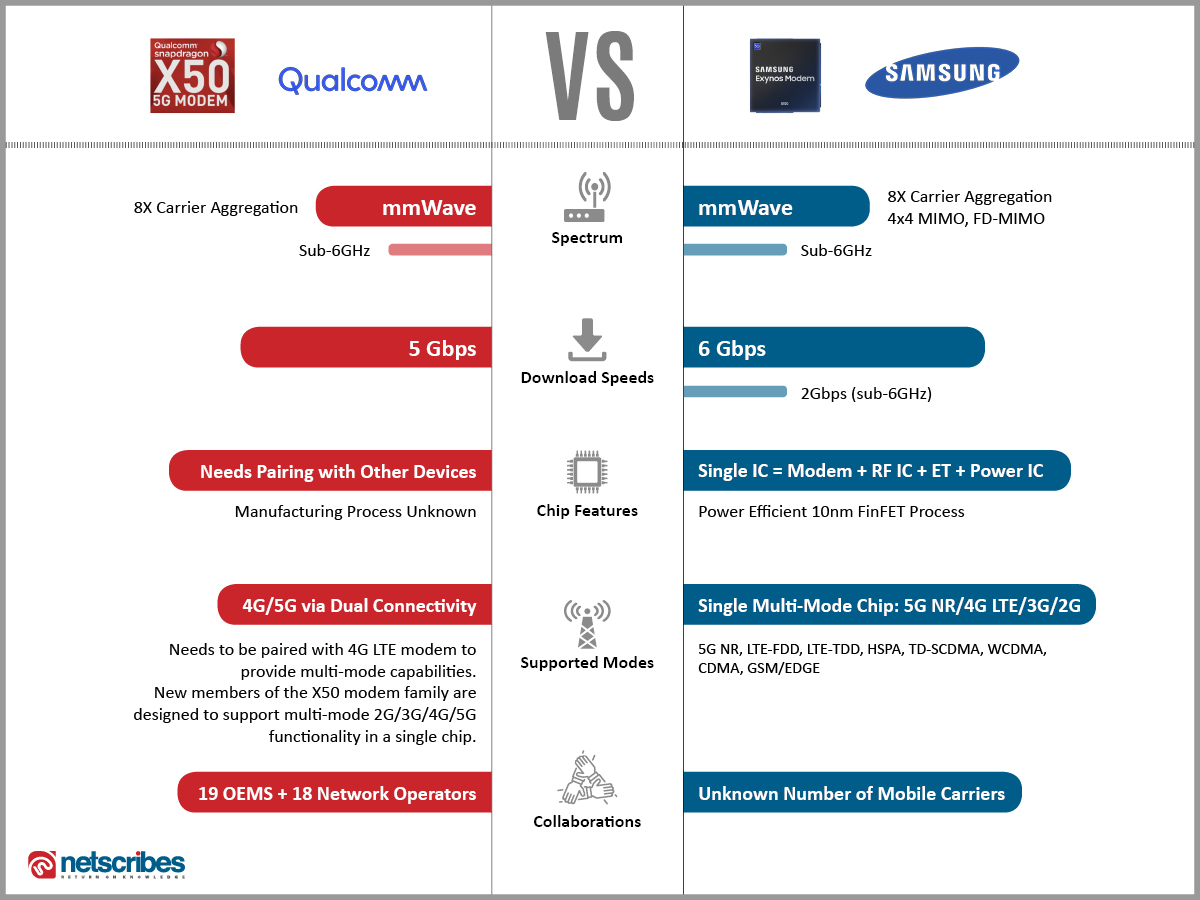With 5G becoming the new speed reality in the not so distant future, network providers, OEMs, and chipset manufacturers alike are racing towards the finish line of production. From enabling Network as a Service to autonomous vehicle connectivity, this new technology has garnered quite a buzz, especially across the mobile handset and service provider industries. The game changer in this technology is really the modem chipset that enables devices to hook on to the lightning fast network.
Among modem manufacturers leading the chase are Qualcomm’s Snapdragon X50 and Samsung’s Exynos 5100. Here’s a quick look how the two products stack up against each other.

Snapdragon X50 by Qualcomm
Technology: Designed on a 7-nanometer system-on-chip solution, the Snapdragon X50 5G can provide multi-mode 4G/5G capability via dual connectivity when integrated with a gigabit-class LTE modem.
Speed: Promises to deliver up to 5-Gigabit-per-second data speeds and 1-2 millisecond latency.
Market: The Americas, Europe, and Asia-Pacific regions
Launch: Qualcomm was the first to introduce a 5G modem early this year. The company expects to see Snapdragon X50-enabled devices hit the markets in the first half of 2019. Demonstrations of the Snapdragon X50 have been lined up for the upcoming Mobile World Congress in Barcelona.
Collaborations: Qualcomm has announced partnerships with 19 OEMs including HTC, Netgear, WNC, Asus, and LG and 18 network providers across the world – AT&T, British Telecom, China Mobile, Orange, and Singtel to name a few.
Related reading: Top 5G modem chipset manufacturers for smartphones
Exynos Modem 5100 by Samsung
Technology: Built on a 10-nanometer process, it features comprehensive 5G and pre-5G standard support, enabling devices to use a single chip to connect with 2G, 3G, 4G, and 5G networks.
Speed: Up to 6Gbps speeds when connected to millimeter wave towers, up to 2Gbps with soon to be more common sub-6Ghz towers, and up to 1.6Gbps with late-stage 4G LTE Advanced towers.
Market: This chipset will enable a single phone to be used in multiple regions, including the U.S. and South Korea.
Launch: The modem should be available for customers by the end of 2018. Moreover, Samsung has already been working on 5G smartphones and plans to launch at least one of its models before Galaxy S10.
Collaborations: The company is working closely with a number of global mobile carriers and partners. Its main agenda is to significantly reduce its reliance on US telecom modem chips for 5G smartphones.
While Qualcomm has the first-mover’s advantage in the 5G modem chipset realm, Samsung is carefully championing its own battles to catalyze its 5G success. As the market continues to expand with Intel, Huawei and Mediatek close at their heels, businesses who seek to leverage the benefits of 5G should constantly keep an eye out for the latest technological innovations to make informed business decisions. Whether the aim is to boost your customer base or upscale your productivity levels, collaborating with the ideal technology provider geared to meet your business need will make all the difference.
Netscribes helps enterprises stay future ready with market and competitive intelligence, based on primary and desk research and IP analysis. Know more about our technology intelligence solutions here.






